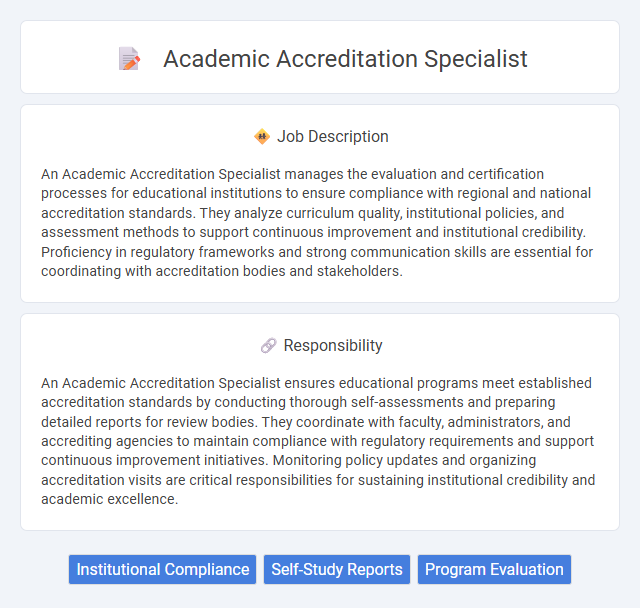
An Academic Accreditation Specialist manages the evaluation and certification processes for educational institutions to ensure compliance with regional and national accreditation standards. They analyze curriculum quality, institutional policies, and assessment methods to support continuous improvement and institutional credibility. Proficiency in regulatory frameworks and strong communication skills are essential for coordinating with accreditation bodies and stakeholders.
Individuals with strong attention to detail, excellent organizational skills, and a passion for maintaining educational standards are likely suited for an Academic Accreditation Specialist role. Those who thrive in structured environments and can navigate complex regulatory requirements will probably find the position aligned with their strengths. People lacking patience for meticulous documentation or uncomfortable with compliance processes may find the job less compatible with their preferences.
Qualification
Academic Accreditation Specialists typically hold a bachelor's degree in education, higher education administration, or a related field, with many possessing advanced degrees such as a master's or doctorate in educational leadership or assessment. Expertise in accreditation standards, quality assurance processes, and compliance regulations is essential, along with strong analytical and communication skills to coordinate with institutional stakeholders and accrediting bodies. Experience in managing self-study reports, data collection, and continuous improvement initiatives enhances a candidate's qualifications for this role.
Responsibility
An Academic Accreditation Specialist ensures educational programs meet established accreditation standards by conducting thorough self-assessments and preparing detailed reports for review bodies. They coordinate with faculty, administrators, and accrediting agencies to maintain compliance with regulatory requirements and support continuous improvement initiatives. Monitoring policy updates and organizing accreditation visits are critical responsibilities for sustaining institutional credibility and academic excellence.
Benefit
Hiring an Academic Accreditation Specialist likely improves an institution's chances of achieving and maintaining accreditation by ensuring compliance with rigorous standards and policies. This expertise probably enhances the quality of academic programs through detailed evaluations and continuous improvement initiatives. Institutions may also experience increased credibility and student trust, which can positively affect enrollment and funding opportunities.
Challenge
Navigating the complex regulatory landscape of academic accreditation demands meticulous attention to detail and an in-depth understanding of evolving standards. Specialists frequently encounter challenges related to aligning institutional practices with stringent accreditation criteria while managing tight deadlines and diverse stakeholder expectations. The role likely involves continuous adaptation to policy changes and intensive problem-solving to ensure compliance and maintain institutional credibility.
Career Advancement
Academic Accreditation Specialists play a crucial role in evaluating and ensuring educational institutions meet rigorous quality standards established by accrediting bodies. Expertise in this field opens pathways to senior positions such as Accreditation Manager or Director of Institutional Research, offering significant career growth and leadership opportunities. Continuous professional development in compliance regulations and assessment methodologies enhances prospects for advancement within higher education administration.
Key Terms
Institutional Compliance
An Academic Accreditation Specialist ensures institutional compliance with regional and national accreditation standards by conducting comprehensive reviews and maintaining detailed documentation. They analyze academic programs and institutional policies to identify gaps and implement corrective actions aligned with accreditation criteria. Expertise in regulatory frameworks and continuous monitoring enables institutions to uphold accreditation status and promote educational excellence.
Self-Study Reports
Academic Accreditation Specialists play a pivotal role in guiding institutions through the preparation and submission of comprehensive Self-Study Reports, ensuring alignment with accreditation standards and criteria. They coordinate data collection, analyze institutional performance metrics, and compile evidence-based documentation to demonstrate compliance and continuous improvement. Expertise in accreditation frameworks and attention to detail ensures these reports accurately reflect program quality and institutional effectiveness, supporting successful accreditation outcomes.
Program Evaluation
Academic Accreditation Specialists play a critical role in program evaluation by systematically assessing educational programs against established accreditation standards to ensure quality and compliance. They collect and analyze data on curriculum effectiveness, student outcomes, faculty qualifications, and institutional resources to identify strengths and areas for improvement. Their expertise supports continuous program enhancement, facilitates accreditation renewal processes, and ensures alignment with regional or national higher education regulations.
 kuljobs.com
kuljobs.com